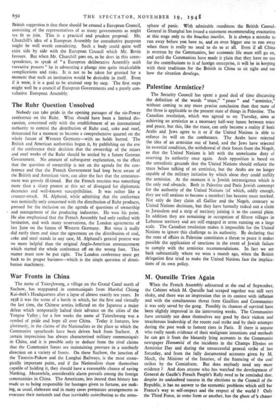Palestine Armistice?
The Security Council has spent a good deal of time discussing the definition of the words " truce," " peace " and "armistice," without coming to any more precise, conclusion than that none of the three is applicable to the present state of things in Palestine. The Canadian resolution, which was agreed to on Tuesday, aims at achieving an armistice as a necessary half-way house between truce and peace, but this, like the truce, can only become a reality if both Arabs and. Jews agree to it or if the United Nations is able to enforce its will on the combatants. The Arabs have rejected the idea of an armistice out of hand, and the Jews have rejected its essential condition, the withdrawal of their forces from the Negeb, so that the United Nations is left with the unwelcome duty of asserting its authority once again. Arab opposition is based on the unrealistic grounds that the United Nations should enforte the truce before talking of an armistice, but the Arabs are no longer capable of the military initiative by which alone they could nullify the armistice. At the moment it is Jewish intransigence which is the only real obstacle. Both in Palestine and Paris Jewish contempt for the authority of the United Nations (of which, oddly enough, they are still anxious to become a member) has become more marked. Not only do they claim all Galilee and the Negeb, contrary to United Nations decisions, but they have formally staked out a claim to Jerusalem and a strip of territory joining it to the coastal plain. In addition they are remaining in occupation of fifteen villages in Lebanese territory and are still engaged in arms running on a large scale. The Canadian resolution makes it impossible for the United Nations to ignore this challenge to its authority. By declaring that the state of affairs in Palestine constitutes a threat to peace it makes possible the application of sanctions in the event of Jewish failure to comply with the armistice recommendations. In fact we are back substantially where we were a month ago, when the British delegation first tried to make the United Nations face the implica- tions of its own policy.


































 Previous page
Previous page